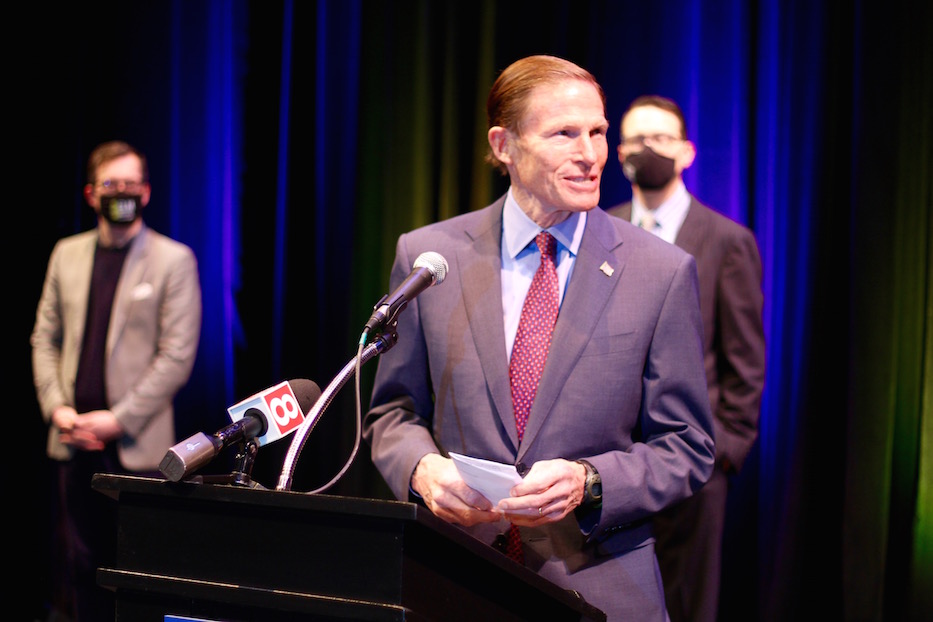
Culture & Community | Economic Development | Long Wharf Theatre | Arts & Culture | Theater | COVID-19
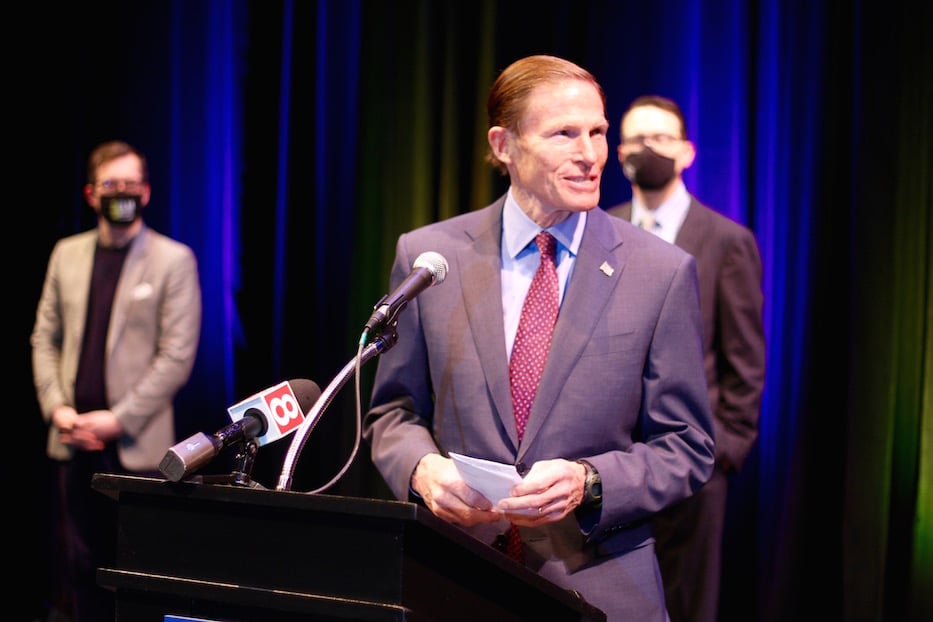
U.S. Sen. Richard Blumenthal at Friday's press conference. Lucy Gellman Photos.
New Haven performing arts venues are about to get a lifeline from the federal government. For many of them, it is long overdue—and will be the first step towards a slow economic recovery.
That news came to Long Wharf Theatre Friday morning, as U.S. Sen. Richard Blumenthal and members of Connecticut’s music and theater industry gathered to fête the $15 billion Shuttered Venue Operators Grant Program, formerly known as the Save Our Stages Act. The program provides grants of up to $10 million in federal relief from the U.S. Small Business Organization. Applications are not yet open.
“We're living through one of the darkest times of my lifetime,” Blumenthal said. “One of the most challenging and painful and grief-stricken. Often heartbreaking. Particularly so when I come to places like this one, where I have sat so often in these seats, as I've done in every one of your theaters. And not only enjoyed, but been elevated by, the magic onstage.”
Connecticut’s six flagship producing theaters include Long Wharf Theatre, Goodspeed Musicals, Hartford Stage, the Eugene O’Neill Theater Center, Westport Country Playhouse, and the Yale Repertory Theatre. Also present were representatives of the Shubert Theatre, Premier Concerts and Elm Shakespeare Company.
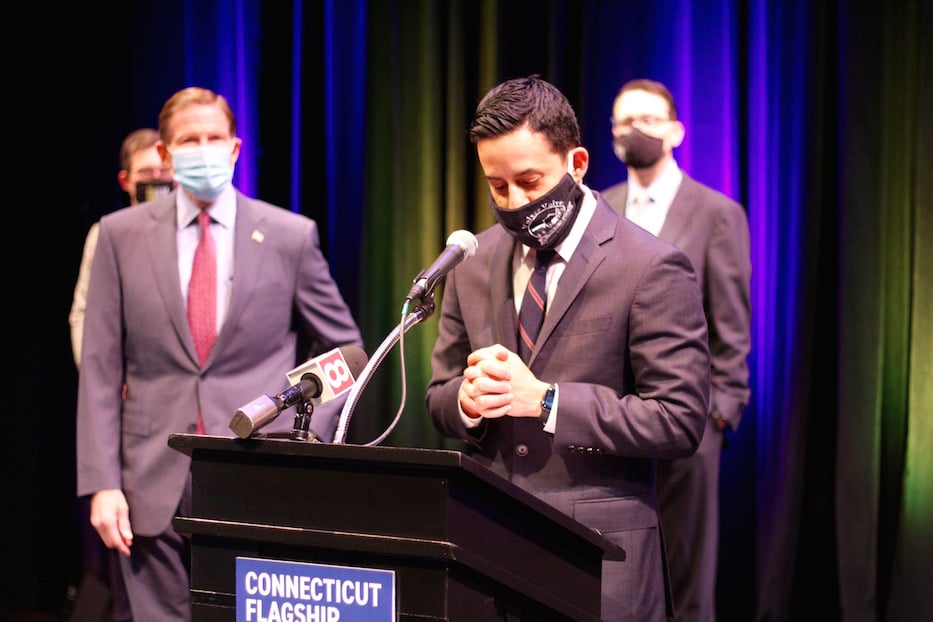
Jacob Padrón, the artistic director at Long Wharf Theatre, began Friday's press conference with a land acknowledgement. He called the funding a vital lifeline to Long Wharf's survival.
The $15 billion measure passed in late December after months of advocacy and vocal bipartisan support from Congress, arts venues, and the National Independent Venue Association (NIVA). In the final package, $10 billion is reserved for live performing arts venues specifically. Two billion, meanwhile, is earmarked for smaller theaters. The grants are renewable up to 50 percent of the original grant.
Friday, artistic and managing directors from across the state drew a line from the performing arts to statewide economic recovery. Prior to COVID-19 shutdowns last year, Connecticut's six flagship producing theaters alone employed over 1,700 people and brought hundreds of millions of dollars into the state’s economy. Connecticut’s arts and culture sector more broadly generated $9 billion, 57,000 jobs, and five percent of the state’s economy, according to Americans for the Arts.
Now, much of that has screeched to a halt. John Fisher, outgoing executive director at the Shubert Theatre, said that the Shubert has been forced to cancel over 300 performances since mid-March of last year. While it has continued to run entertainment and educational programming online, very little of that has generated substantial revenue. In the 10 months that it has been closed, the theater has laid off or furloughed over 150 staff members, from part-time box office representatives to stagehands.
"Many theaters and venues across the state and the entire country are at risk of permanent closure without this important and critical funding," he said. "This legislation will help ensure the survival of the Shubert, Long Wharf, and all of our other theaters and venues throughout the state."
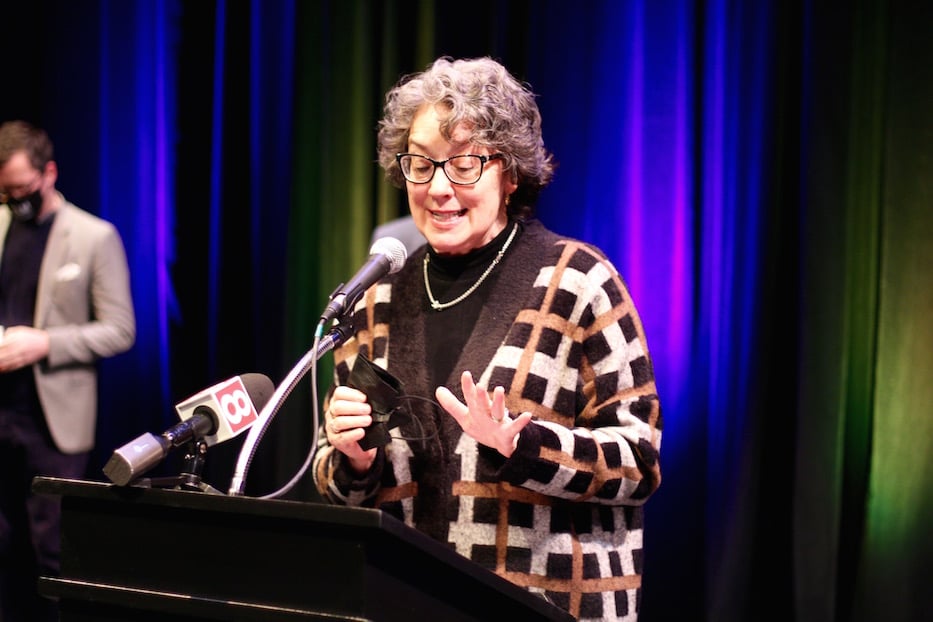
Donna Lynn Hilton.
As money flows in from the federal government, theaters can also start bringing back staff members who may not have received a paycheck for almost a year. Donna Lynn Hilton, who only recently became artistic director at Goodspeed Musicals, said that the funding will allow the theater to bring back some of the 250 jobs it has eliminated since last March, while employing upwards of 200 artists, designers, and contractors that it would work with in a normal year.
At Westport Country Playhouse, those dollars mean bringing back staff and working towards a season in the spring. Last year, the theater the pandemic forced the theater to close for the second time ever in its 90-year history (the first was during the Second World War). To survive, it cut its annual budget from $5.5 million to $2.3 million, and reduced staff of close to 30 to just nine.
Managing Director Michael Barker noted that those numbers don’t include the 200 to 250 artists the theater employs for performances, only a fraction of whom were able to return for its radio performance of A Christmas Carol.
Others focused on the performing arts’ ability to bring people together and spark dialogue at a time of partisan divisiveness. Jacob Padrón, who has been the artistic director at Long Wharf Theatre since early 2019, suggested that theater is uniquely positioned “as a space to heal, as a space to change lives, and as a space to celebrate our shared humanity.”
Long Wharf has been no exception to the pandemic’s economic toll: it has eliminated 40 full- and part-time positions since March 2020. In an email Friday evening, Managing Director Kit Ingui said that the theater has lost "about $1 million in projected earned revenue."
"Public support is essential to our survival,” Padrón said. “We all want to bring people—artists, staff, and audiences—back to create the art, tell the stories, and share the music that can help repair the damage our human infrastructure has suffered since March."
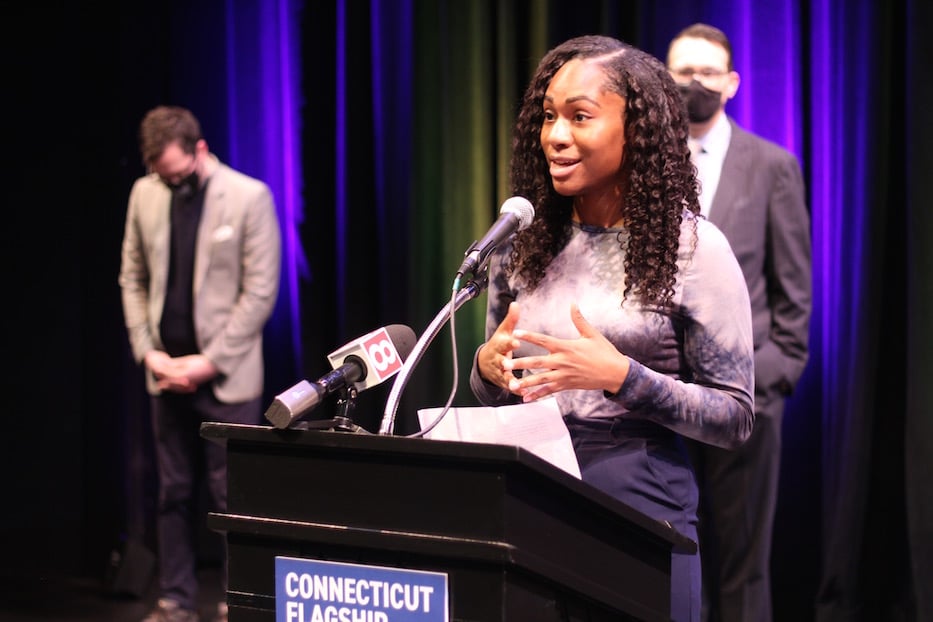
Adriane Jefferson: "It has the power to change hearts and minds, which is so needed during this unprecedented time. I think what we witnessed last year, and going into this year ... we've witnessed how dark our lives can be without the arts.”
Adriane Jefferson, director of Cultural Affairs for the City of New Haven, pointed to the need for sustained federal support of the arts during the months ahead and also beyond the pandemic.
“The arts not only contribute economically, but evoke conversation, change, and dialogue,” she said. “It also inspires communities. It inspires people. It has the power to change hearts and minds, which is so needed during this unprecedented time. I think what we witnessed last year, and going into this year ... we've witnessed how dark our lives can be without the arts.”
Is More Help On The Way?
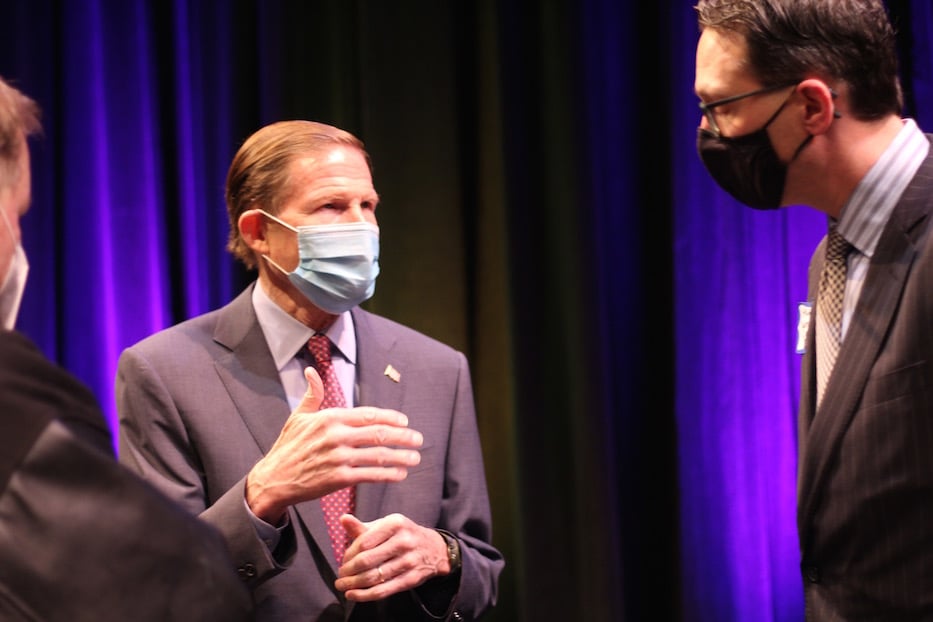
Blumenthal with John Fisher (left) and Michael Barker (right).
Friday, Blumenthal said that he still sees the measure as a bridge, rather than a panacea. He is hopeful that President Elect Joe Biden will announce more federal relief funding, including dollars earmarked for arts and culture, after he takes office next week. On Thursday, Biden announced a $1.9 trillion COVID-19 stimulus package that he hopes to pass in his first days in office.
For Blumenthal, support for the theater is as personal as it is political: he has been attending plays on his own since high school, when he would buy standing room only seats on Broadway. After seeing Hamilton with his family a few years ago, he advocated for the Better Online Ticket Sales (BOTS) Act while quoting Lin Manuel-Miranda’s “The Room Where It Happened” in Congress.
“When you think of life's experiences, we become so isolated,” he said. “Whether it is bringing together families, friends, neighbors. When you're sitting in a theater, you have no idea whether the person next to you is a Republican or Democrat ... They bring together people in a very unique way and break down the barriers that often divide us."
He added that Biden’s Friday appointment of Dr. David Kessler to lead Operation Warp Speed has left him feeling more optimistic about a faster vaccine rollout, which would be good news for theaters. For weeks, Barker has been talking to both the state and elected federal officials about when arts workers, who are often a theater’s first line of contact, might qualify for vaccines. Biden has declared it his mission to get 100 million vaccines into 100 million arms in his first 100 days in office.
As of Friday afternoon, the state was continuing its rollout of Phase 1B. Those who qualify for Phase 1C have not yet been announced.
“If the country left vaccinations to the live events industry, we’d have it done over the weekend,” joked Premier Concerts President Keith Mahler to laughter. “We’d have t-shirts. We’d have beer. We could do a meet-and-greet with Dr. Fauci.”
Find out more about the Shuttered Venue Operators Grant Program here.

